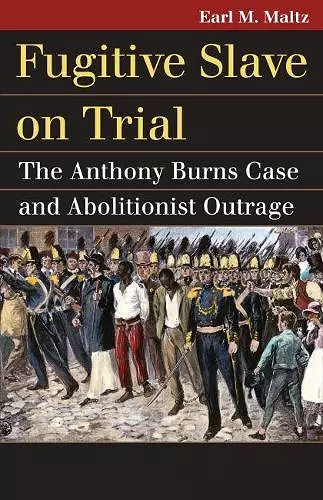Fugitive Slave on Trial
The Anthony Burns Case and Abolitionist Outrage
Format:Paperback
Publisher:University Press of Kansas
Published:26th Oct '10
Should be back in stock very soon

When runaway slave Anthony Burns was tracked to Boston by his owner Charles Suttle, the struggle over his fate became a focal point for national controversy. Boston, a hotbed of antislavery sentiment, provided the venue for the 1854 hearing that determined Burns's legal status, one of the most dramatic and widely publicized events in the long-running conflict over the issue of fugitive slaves.
Earl Maltz's compelling chronicle of this case shows how the violent emotions surrounding it played out at both the local and national levels, focusing especially on the awkward position in which trial judge Edward Loring found himself. A unionist who also supported enforcement of the Fugitive Slave Act, Loring was committed to the idea that each individual case should be decided by reference to neutral principles, which ultimately led him to remand Burns to Suttle's custody. Although, as Maltz argues, Loring's decision was indisputably correct on the facts and justified by existing legal precedent, it also ignited a firestorm of protest.
Maltz locates the Burns case in arguments over slavery going back to the Constitution's rendition clause, then follows it through two iterations of federal statutes in 1793 and 1850, a miniature legal war between the governors of Massachusetts and Virginia, and abolitionists' violent resistance to federal law. He also cites Loring's intellectual honesty and determination to apply the law as written, no matter what it might cost him.
As the last of a series of high-profile disputes in Massachusetts, the Burns case underscores the abolitionist attitude of many of the state's residents toward the fugitive slave issue, providing readers with a you-are-there view of an actual fugitive slave case hearing and encouraging them to grapple with the question of how a conscientious judge committed to the rule of law should act in such a case. It also sheds light on the political costs and consequences for any judicial official attempting to deliver a decision on such a controversial issue while surrounded by a hostile public.
A story as dramatic and compelling as any in our legal annals, Fugitive Slave on Trial dissects an important historical event as it sheds new light on the state of the Union in the mid-1850s and the events that led to its eventual dismemberment.
“A detailed, readable account of the most politically charged American slave-rendition case. . . . Maltz helps to explain the influence and notoriety of the Burns affair, his careful attention to its legal background and enduring political significance in Massachusetts elucidates key dimensions of a pivotal moment in the antebellum sectional conflict. . . . [The book is ] well -suited for students exploring the legal history of slavery and freedom or of nineteenth-century federalism.”
—Journal of Interdisciplinary History
“Maltz has written a sleek, streamlined history of the Burns case [a remarkable and under-studied episode in American history] that no doubt will become the standard reference for legal scholars while at the same time providing a suitable introduction for a more general reading audience.”
—Law and Politics Book Review
ISBN: 9780700617364
Dimensions: 219mm x 140mm x 13mm
Weight: 255g
192 pages